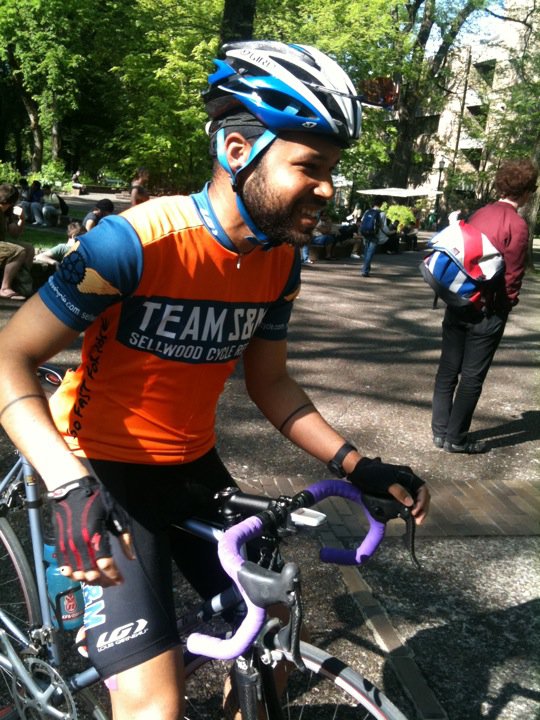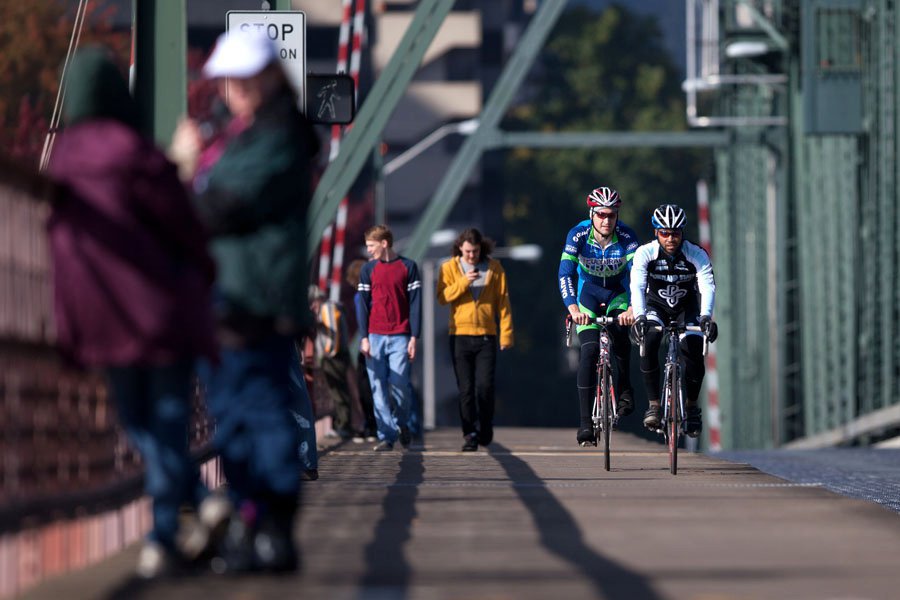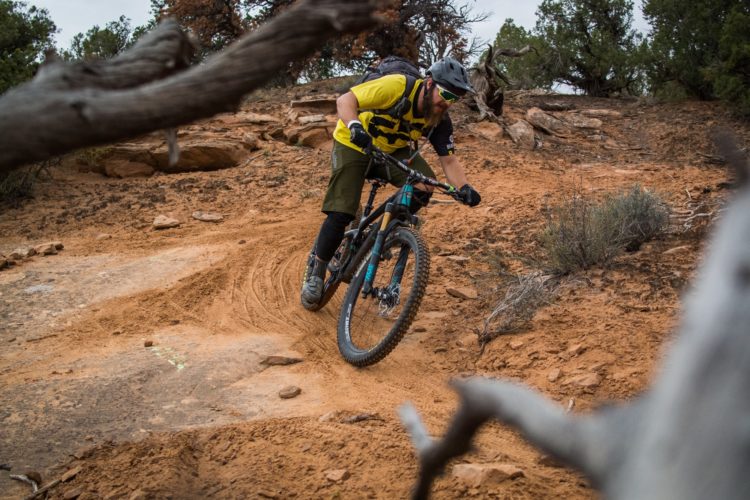Avid athletes and weekend warriors alike throughout every granular niche of cycling culture are asking the same important question right now. “How can we make this amazing sport more welcoming to people who are not well represented, in case they want to try it out?” The best place to look for answers to that complex query is by listening to and learning from the cyclists who belong to different underrepresented groups. How did they get into the sport? What would have made the experience feel more welcoming? Was there anything about getting into bike riding or racing that was particularly difficult, off-putting, or offensive for them, based on their identity?
I recently asked my friend Miles Crumley some of those very questions, and he was kind enough to share his perspective as a Black, gay bike racer. Crumley lives in Portland, Oregon, where the cyclocross and road scene are as rich as the local beer and coffee scenes, and the mountain bike community continues to grow exponentially.
Crumley moved out to the west coast from Atlanta, Georgia, and dove into bike racing while attending college at Portland State University. He later accepted the role of Northwest Collegiate Cycling Conference director and kept the conference running for exactly ten years before handing off the baton this spring. For Crumley, the role of collegiate cycling, and any organized bike event body for that matter, is to create ways for people to enjoy riding bikes together. He has given countless hours and undivided energy to making sure that happened. Throughout his tenure as conference director, he worked to successfully expand the collegiate women’s field to a record number of competitors and created the first collegiate race for hand cycling athletes. He did all of this work while also experiencing all forms of bias and discrimination from parents, organizers, and race officials alike.
This interview with Crumley was initially focused, in part, on what NICA and USACycling could do to better facilitate a seamless path through the sport for riders and racers in their ranks. He has a lot of fantastic ideas around ways to keep riders in the sport once they join, and how to add non-competitive and low-barrier events that will entice new and diverse crowds of two-wheeled enthusiasts. While we hope to dig back into the topic of cycling’s governing bodies cooperating to grow the sport, the subject of biases throughout bike culture emerged as the pressing matter that he was ready to share some experiences and thoughts on.
Do you feel welcomed by your local cycling culture and the broader industry?
Not really, and that is ok with me. I do have a local cycling shop (Sellwood Cycles) that I go to for bike repairs. I did race for their team from time to time. My main intention when I started cycling was/is to ride bikes. Portland has changed over the years. Fifteen years ago, there was a lot of cycling “stuff” to do so I met a lot of people. Everywhere I went I was the token. After a while, I just stopped going because it wasn’t as much fun to go ride bikes and constantly be the only black guy. And I’m gay.
Have you experienced bias actions/attitudes or racism in cycling culture or in the bike industry?
Yes, but they are all microaggressions. The majority of the time no one notices or it’s hard to explain. The majority of the bias I get comes in the type of service I get. For instance, I can walk into a high-end bike shop, touch one bike, and have someone follow me around and provide me service the entire time I am there. Which is cool at first… except, why do I always get followed when I go into these stores? On the flip side is sometimes I just won’t get any service at all. Store people ignore me. Refuse to answer questions. Dismiss my concerns. And it is even more awkward when I am trying to actually purchase something and the person would rather me just not be there. It hurts.
I also was on the end of it as conference director and race official. I worked with some really awesome people at the NWCCC. The riders, teams, spectators, volunteers, and officials: all are a great group of people that I worked with over the years. I ran the conference for 10 years to the month: May 2010 to May 2020. I had a lot of good experiences sprinkled in with some experiences that I would never wish on anyone.
However, it wasn’t always fun and games. Some of the people that I worked with wanted to go over me. A lot of parents talked down to me. I remember one instance at a race, a senior official overruled me on a decision that was outside of their purview. Those things happen and it just destroys your confidence. “Yes you are right but can you not be right right now?”
The challenge is that a lot of people do not know what to expect when they meet a black person. The media has created these “urbanized” images of the American Ghetto which isn’t even close to being true. So to come across a middle-class parent making demands of me and then appealing to every white official at a bike race is insulting. I grew up middle class too. We are the same people. I just come with a starter tan.

Is it important to you to have role models and representation in the sports you participate in?
I think this is important but I caution against things turning just into pictures. I always contend that everyone got what it means to be diverse wrong. Diversity is not about numbers; having X number of this or the first black that. Diversity is having a mixture of people around that prevents you from saying stupid stuff to the wrong person. Whatever mix keeps you in check so that you do not awkwardly expose your ignorance of others is what it is about, in my opinion. Therefore, if you have imagery of more black cyclists (and black queer cyclists, etc) then it can allow others to learn about how diverse (and at the same time, similar) we all are. Diversity is like spice: the amount you add depends on what you’re making. But without it, everything tastes bland.
Do you see your cultural experience or background represented in cycling-related advertisements, at events, in clubs, or on professional cycling teams?
No, because I have weird cultural quirks. I am black and gay. Born in California. Grew up in the south. My parents went through desegregation. I’ve been to the fields where my ancestors worked the ground. I went to college and I work a desk job. How do you market to that? I am not the cookie-cutter stereotype of a cyclist. I mean, we can’t do the Plantation 400 Miler Stage Race. Any ad that has a mixture of diverse presentations resonates more with me because I do not fit the mold of what it means to be a “standard” person. In a way, the tattooed, pierced, different skin-toned, weird haircut, odd glasses, and weird shaving pattern people pictures are what I like seeing.
How do you feel when riding and adventuring in rural areas of the US vs. riding in or near a city?
When I was younger, I did not mind it too much. When I first moved to Oregon, a friend that I met in Atlanta who was from Oregon told me never to leave the city. I lived in Eugene for a time period and I rode my bike maybe once or twice when I was studying. And then I started to ride with people. These days, I do not travel outside the city alone to “camp.” I grew up in the south with lots of trees and woods. I do like city riding although, I am slowly getting back into it. I was bike commuting to work and then the pandemic started.
I do think that future urban development models should include areas for people to mountain bike in the city. And no, I am not pandering. This is a serious thought: if you give people access to spaces and remove the barriers to entry, the diversity you are looking for will find you. It’s like cayenne pepper. Everyone hates spice. On and on. Well just add a little. Remove that barrier to entry. Maybe mix it with something. Cut it with lime. Maybe use a little. Over time, maybe cayenne isn’t your thing but paprika hits the spot. That is the point: give people access to bike lanes and off-road trails and walking paths near to where they live. I did like in Eugene [Oregon] how you could take the LTD (transit bus) to the edge of town and then go mountain biking. We need that, but more. Intentionally designed communities that mix the urban and the forest and allow people to recreate. And these aren’t crazy ideas, they are backed by actual research!
Diversity is like spice: the amount you add depends on what you’re making. But without it, everything tastes bland.
What are some things that individual cyclists can do to make the sport more welcoming for people of color?
If someone tells you something is offensive, it is likely offensive. So why not just change. Years ago, I had a picture up on the NWCCC website, which was in poor taste. And it was brought to my attention. And I got defensive. Over time, I realized that I could be defensive and unintentionally scare away people, or I can make the change and move on. So I made the change. Maybe it was too late and I did scare a bunch of people. I am sorry, by the way. Yes, I too can be a fat head, but I too take ownership and made the change. But seriously, I felt bad. Oh, and I did do the thing where I asked people in that group if they thought it was offensive to see if I was in the clear to keep it up. Nope, still offensive. Take it down and move on.
What are some things that the bike industry can do to make the sport more welcoming for people of color?
Remove the barriers. A lot of the barriers are just micro-aggressions that people don’t know. Black people are expected to be the experts at everything. This is 1) unfair and 2) not even close to true. Cycling is not an easy thing to get into. It has a different set of expenses that make it difficult to a person new to the sport to understand.
Then comes the “shame” of not spending enough. For instance, you want to get into mountain biking: bike, shoes, jersey, helmet, water bottles, etc. You can easily spend thousands of dollars on equipment that can break the first time you use it. Some people may purchase items that are in their price range and sometimes it is lesser quality. You go to a bike race and someone says to you, “Oh those shoes look so gay…” yea, stop right there. That is a microaggression.
Last time I checked, America allows you to spend money how you choose. And if I choose to go cheap, that is not “ghetto,” it is the price that I decided to pay for said item. And it is always over trivial items: water bottles, bar tape, etc. If my water bottle looks so ghetto, maybe I will go play a sport where they don’t care about how water bottles look. Besides, my mom gave me this water bottle and it is lucky to me. But who has time to say all of that 100 times a day?
How could cycling events be more inviting to cyclists who are people of color?
I think the answer is why should people of color ride bikes? Cycling has a problem in that the events are overlaid on something else, apart from some forms of closed-loop/private racing. Most other bike races just come ripping through town, jamming up traffic, and leaving empty Gu packets. However, some of the more diverse events I have been to have cultural fairs.
Years ago, there was the Mississippi Street Fair in Portland and there was a bike race. That was an awesome event and a great way to get all types of people excited about cycling. The fair showcased many of the remaining black businesses on Mississippi and the highlights of the neighborhood. However, don’t do it in the pander way: be genuine about the event and the community you will be temporarily impacting.

A few brands, like Specialized, SRAM, and Trek have recently promised to donate money to various organizations aimed at promoting diversity in cycling. Where do you feel that money would be most effective?
In my opinion, people need spaces to be able to safely enjoy a sport. Build a dirt track on an empty lot in a diverse part of town. Which is funny, because when I go to places with lots of people of color and they have green space nearby, there are tons of people of color there. Yes, people of color recreate too. However, proximity plays a factor in your willingness to engage. So yes, I would love to go to the Specialized Pump Track in North Portland, right next to Jefferson High School (the “black” high school). Also partnerships with local non-profits that do outreach for safe routes to school. In Portland, we have the Community Cycling Center.
Last, and this is just weird saying this: I think that cyclocross is probably the funnel into all types of cycling going forward. It is a mix of everything: running, cycling, barriers, strategy, timed event, and problem solving. The furthest you fall is a few feet. You can complete the race on foot so even if you have a failure, you still get that “woo, I finished something” feeling. You can do it on any bike. It has different terrain. I don’t know why these companies don’t stand outside of high school football games with a big trailer of bike. [Cycling is] a sport that, with the appropriate precautions, will not expose you to repeated concussions. You still get the team experience, it is outside, all weather. Win-win to me.
For folks who are just now acknowledging the white male majority in cycling/mountain biking, what do you see as some of the larger shifts that need to happen in the future?
The same reasons that white males participate in cycling/mountain biking are the same reasons why everyone else wants to do it. This goes for including women too. Granted, I made mistakes along the way but that’s life. I needed some different spice in my life to tell me that perhaps what I was doing was not in everyone’s best interest.
But I just want the same care and attention that a white male gives to their peer. If you can take the time to teach your peer how to ride bikes, then you can use that same tone when teaching someone who doesn’t look like you the same thing. And if the person says you’re being offensive, you are. Just make the adjustment and move on. That interaction is one of the millions you will have but you may never have another chance to redo that interaction.

We would like to thank Crumley for taking the time and energy to share his experiences and thoughts on how cycling could be more welcoming to more people.























1 Comments
Jul 13, 2020